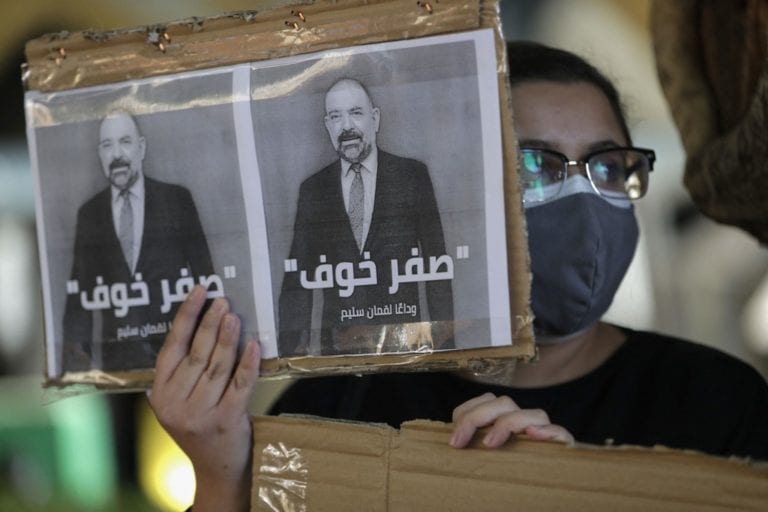It is not easy to wait for justice when you live in the Middle East. Worse. It is not easy not to fear justice.
I started my day watching the 2019 film about Jamal Khashoggi released by The Washington Post in anticipation of the release of the intelligence report on his murder. It is a straightforward 24- minute documentary that seeks justice for Khashoggi without portraying him as an absolute hero, but as the man he was: a Saudi national, who undeniably loved his country, who had a long career in journalism, who spent a lot of time close to the ruling circles and who – in that crazy spring of 2011 – started believing that reform was possible in all countries in the Middle East, including his own. Khashoggi was never defamatory, yet his growing criticism of the Saudi ruling elite was enough to get him killed.
The film goes on to expose the different stages the CIA investigation went through, and the growing discrepancies between its findings and the position of former President Donald Trump, who was quoted as saying that within his America First approach it was unthinkable to compromise a military deal worth some $110 billion over a journalist’s murder.
The film closes with a quote from Greg Miller saying: “When an American president has the impulse to downplay the murder of someone who is trying to fight for freedom, democratic reforms and human rights in a place like the Middle East, a place that has been deprived of all those values … it’s a dark time for the people fighting that fight.”
In the hours between me watching the film and the report’s release, Miller’s words were all I could think of, alongside the blurry images and sounds related to Khashoggi’s murder three years earlier. The sound of an electric saw. And music from the film Pulp fiction.
I look for logical guarantees, yet fail to find any. Logic, like history, tells me I should be terrified. The dark times for those fighting for human rights, freedom of speech and democratic reform are about to get darker.
Khashoggi’s murder, in broad daylight, under the eyes of the world, was supposed to teach journalists who dare cross the line a lesson. Today, the journalist in me could not but feel some sense of justice.
In my mind I put a rose on an imaginary grave and smile at the colleague I never met. A little bit of justice for Jamal, feels like a a little bit of justice for us all.
As I read the US State Department’s Accountability for the Murder of Jamal Khashoggi, I was comforted by the undeniable distance between the statement’s clear wording defending those “who want to exercise their human rights and fundamental freedoms without fear of government retribution, retaliation, punishment or harm” and the words of Donald Trump, who repeatedly undermined Saudi Crown Prince Mohammad Bin Salman’s responsibility by claiming he was “a key ally and partner.”
As I read the US State Department’s Accountability for the Murder of Jamal Khashoggi, I was comforted by the undeniable distance between the statement’s clear wording defending those “who want to exercise their human rights and fundamental freedoms without fear of government retribution, retaliation, punishment or harm” and the words of Donald Trump, who repeatedly undermined Saudi Crown Prince Mohammad Bin Salman’s responsibility by claiming he was “a key ally and partner.”
The statement confirming the Biden’s administration commitment to human rights and freedom of speech is undoubtedly consolatory. However, it’s far from reassuring.
In Beirut, where I live, the sense of seeing some justice prevail, rarely comes free of fear for the costs it might entail.
The statement by US Secretary of State Anthony Blinken’ emphasized that “extraterritorial threats of assaults by Saudi Arabia against activists, dissidents, and journalists, will not be tolerated.”
But what about threats and assaults against activists, dissidents and journalists inside Saudi Arabia? What about the threats, the oppression and the assassination of those who continue to live in almost every other country in the Middle East?
The examples of American priorities turning the lives of local dissidents, journalists and activists into unfortunate, yet needed collateral damage are just too many to ignore.
What about the region’s other killers? What about Assad in Syria, Sisi in Egypt and the mullahs in Tehran?
Will the standards now imposed on Saudi Arabia also be applied on Iran? The Khashoggi Ban only introduces “visa restrictions,” on “76 Saudi individuals believed to have been engaged in threatening dissidents overseas, including but not limited to the Khashoggi killing.” What does that mean? No more DisneyLand visits for them?
Will the murder of journalists and dissidents be a no go for Iran and its allies in Lebanon, Iraq and Yemen? Or will the nuclear talks be deemed more important?
I want to believe that the price for the nuclear negotiations in Tehran will not mean giving Hezbollah a free hand in Lebanon. And that the price for a little justice for Jamal Khashoggi will not mean a little less justice for Lokman Slim.
When the thinker, publisher and critic of Hezbollah was killed in south Lebanon last month, many saw it as a message from the party to all those who dare oppose it, especially among Shia Muslims.
Prior to his death, Slim had informed the Lebanese authorities that he had received direct threats. He had named Hezbollah and the Amal Party as the ones responsible for any harm that would happen to him or his family. He asked for protection, but never got it.
All he got was six bullets to head and neck.
The investigation into his assassination is not getting anywhere, but regardless of who pulled the trigger, Hezbollah is responsible for Slim’s assassination.
For many, his murder is only the begining.
Unlike Khashoggi, he was not a lawful permanent resident in the US. He was an intellectual who decided to stay in his own country and he was killed for fighting for the exact same values the Biden administration now claims to be committed to.
Is a little justice for him less important, because he lived in the wrong country? Or because he was killed by the wrong murderer?
Today is a day for Jamal. And I want to separate this slight sense of content that I have, from this heavy feeling that a big loss is on its way.
I look for logical guarantees, yet fail to find any.
Logic, like history, tells me I should be terrified.
The examples of American priorities turning the lives of local dissidents, journalists and activists into unfortunate, yet needed collateral damage are just too many to ignore.
The dark times for those fighting for human rights, freedom of speech and democratic reform are about to get darker, but today a little justice was done to Jamal and I want to celebrate.
It is in the virtual world that I find some comfort.
In a room on Clubhouse named Justice for Jamal, I listen to Arab activists, journalists and dissidents discussing plans and ideas with their western counterparts to build on what has already been achieved and to ensure that Justice for Jamal does not mean less justice for the rest of us.
Here, believing in a better future is possible.
But it has been a long day and finally I surrender to the tears I have been fighting back. All it took were a few simple words by an Egyptian journalist, who said confidently: “From wherever Jamal is, he’s winking, and hinting they are terrified!”
It’s true. We may be exhausted. But they are terrified. Though no one hears the sound of the electric saw, we are being killed every day. Yet, we are still here, and we are still fighting, and there will come a day when we fight for justice without fearing its consequences.
Read Also:







